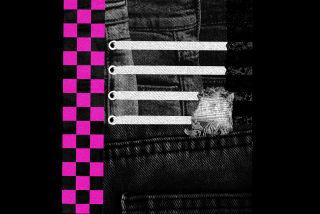Blythe Street Honors Its Achievers
- Share via
PANORAMA CITY — Eloy Reyes symbolizes detente on Blythe Street. Born in Mexico and still lacking United States citizenship, the 17-year-old is the first youth from the gang-infested neighborhood in years--some say, ever--to graduate with honors from high school.
Eloy resisted the lure of gangs, avoided drugs, joined a youth group and kept counsel with other residents working to increase the peace and improve slum-like conditions on the street, long identified with drive-by shootings and rampant drug dealing.
But with every A and B grade he earned at Monroe High School, Eloy provided written proof that, given a break from the gang violence, overcrowding, drug dealing and hunger once ubiquitous on his block, he and his peers could actually succeed.
This afternoon, Eloy and another member of the Blythe Street Youth Leadership group, Abel Farias,, 18, who graduated earlier this month from Monroe as a top-ranked junior Reserve Officer Training Corps cadet, will be honored at the neighborhood’s first graduation celebration with about 180 other high school graduates and students moving from elementary to middle school.
The celebration is being sponsored by the youth leadership group, Residents United of Blythe Street and the San Fernando Valley Partnership. It will begin at 3 p.m. on Blythe Street between Van Nuys Boulevard and Willis Avenue, where the street will be blocked to traffic.
“This is the year that Blythe Street has had the most graduates,” said Margaret Welch, director of the Blythe Street Project, a community services group. “The kids have been receiving much more encouragement about staying in school, and the drop-out rate is down. Tutoring programs and the youth activity groups are making a difference.”
Welch and other social service providers said Eloy and Farias are examples of the potential of the several hundred mostly poor, immigrant students who reside on the street.
“It’s special to see these students make it, especially kids like Eloy, who came here as immigrants. “ said Albert Melena, director of the Blythe Street Youth Leadership group, which formed about four years ago to provide a recreational outlet for teens on the street. “The amount of stuff they put up with from gang members, with drug dealers, it’s a big deal for them just to make it to school in the morning, much less graduate with honors.”
The goal of today’s celebration is to show younger kids what studying and staying out of trouble can do for you. But right now, Eloy isn’t sure what that is. Because he is not a U.S. citizen, he has not applied to college. And even if he were accepted somewhere, he couldn’t afford it.
“I don’t know what to do,” said Eloy, a quiet, clean-cut teen whose favorite subject in school was math. “Maybe work a while, then junior college,” added Eloy, who is reticent about his status as the smartest kid on Blythe Street. “I had a 3.2 [grade point average],” he said, with a shrug. “I took easy classes. I studied one or two hours at night.”
Eloy’s former English teacher was surprised to learn this week that one of her star pupils hailed from such a tough neighborhood. “He didn’t trade on any difficulties of his background, and I never gave him any special consideration,” said Linda Lewis, who awarded Eloy A’s in both classes she taught. “In order to succeed, you have to put blinders on, and that’s basically what he did . . . He was looking beyond the immediate, he took the long view and the payoff will be greater.”
But Eloy’s uncertainty about his future in some ways mirrors the situation on the street, which has become a safer, cleaner place in the last year, thanks to the combined efforts of community groups, churches and a city housing program that helped renovate some of the crumbling, low-income apartment buildings on the block.
But many residents now wonder what will happen when a planned shopping center and movie theater complex are built on the site of the former General Motors plant on Van Nuys Boulevard. Some fear the price of housing will increase and that they will be forced to move elsewhere.
Farias, though, has a plan. He will meet with an Army recruiter, take some tests, and if he is accepted, he said his long-term goal is to become a member of the elite Special Forces division.
The former gang member--the youngest and the first of 10 siblings to graduate from high school--said he signed up for ROTC classes at Monroe because he thought they would be easy. But as he made friends in class and with instructors, he began to appreciate the system that rewarded him with rank and responsibility each time he completed tasks.
By the time he graduated, Farias was a first lieutenant who held the title of special activities commander. He was required to dress in military uniform on Fridays, and the gangsters on Blythe seldom failed to tease him about it.
“They called me ‘G.I. Joe’ or ‘Forrest Gump,’ ” Farias said. “I didn’t mind it much. When I’m in the Army, I guess they won’t be joking.”
Eloy and Farias both attribute their success in part to the support of their teachers, the leadership group and other residents on the street. “It makes a difference,” Eloy said. “It’s better having something to do, whether it’s a meeting, or a project, or sports.”
Farias added: “All it takes is someone to show us another way of doing things.”
More to Read
Sign up for Essential California
The most important California stories and recommendations in your inbox every morning.
You may occasionally receive promotional content from the Los Angeles Times.













